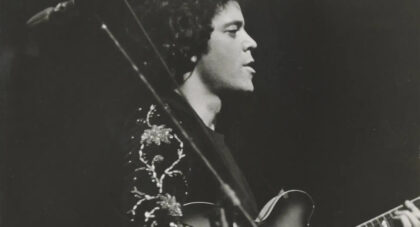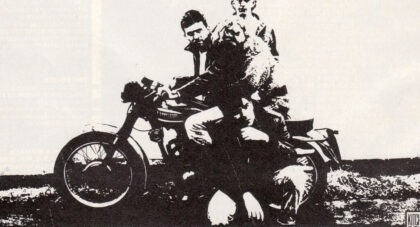Among certain critics and cultural trainspotters, there exists a colloquialism — ‘gamechanger’ — to denote a brazen, unexpected creative leap by an already respected and established artist. The risk of potentially alienating a listenership that increasingly has more choices than patience is a perilous one, but to take such a gamble and succeed can earn an artist irreproachable status henceforth. Some examples of historical gamechangers are Talk Talk’s Spirit of Eden, Radiohead’s Kid A, and Scott Walker’s Tilt. We may soon be adding to this list the new album by New York-based guitarist Steve Gunn, whose Time Off, released June 18th on Paradise of Bachelors, finds the formerly ubiquitous psychedelic journeyman exploring traditional songwriting through a prism of airy blues, ambling jazz-folk, and subtle but virtuosic guitar dreamweaving. For starters, imagine the Dead’s “Bird Song” performed by guys who know all the Sun City Girls records by heart. Not so much an about-face as a panoramic zooming-out, Time Off should introduce Gunn’s beguiling music to an entire new audience even as it retains the spirit and the logic of his earliest and most experimental work. I got to talk to Steve about Time Off, declining lucrative record deals, and how legends like Jack Rose and Michael Chapman have influenced his life as much as his music.
James Jackson Toth: This may seem like mundane way to start, but despite the fact that you’ve been around a while, there seems to be a relative dearth of biographical information about you out there. Let’s start with your roots in the hardcore scene. Is that when you started playing music, or were you already playing by then?
Steve Gunn: I was definitely playing before I got into hardcore. When I got my first instrument I was borrowing music from my older sister, like Misfits tapes, and stuff like that, and I was also listening to rap. It was kinda all over the place. A few years later, in high school I started getting into punk and hardcore. Around then I started playing with other people, going over to people’s houses and playing in their basements and things.
JJT: And was this in Philly?
Steve Gunn: Yeah. I lived out in the suburbs of Philly, and then during my freshman year of high school I started going to the city, and going to shows - punk shows and all other kinds of different shows. And this is when I started hitting up record stores.
JJT: This was before you met Jack (Rose) and Bardo Pond and all those Philly folks, right?
Steve Gunn: Oh, yeah. I actually convinced my parents to let me go on a small tour the summer between my freshman and sophomore year of high school. I played in this really terrible hardcore band — we were doing Chain of Strength covers and stuff. We even played a couple shows with that band Mouthpiece. And I somehow convinced my parents to let me go. I basically cried, and they were finally nice enough to give me the OK.
JJT: Skipping ahead a bit: the first time I met you, I think you were playing with GHQ. For those who don’t know, GHQ is a long-running band that, at one time, included Helen Rush of Tower Recordings and Metal Mountains, but was a trio of Pete Nolan and Marcia Bassett when you joined. How did this collaboration come about? Were you aware of Un at this point?
Steve Gunn: I was definitely a big Un fan. When I was in college, I moved into a house with these older guys, and they had all these records, and it kinda opened up my world. That’s when I got turned on to all those Siltbreeze bands, and I got to see most of them [play live]. And I definitely became a fan of Un and saw them a bunch of times and I became friends with Grant [Acker] and Marcia. When I moved to New York, I was still keeping in touch with Marcia, and I started playing around and doing these sort of pick up jams with her and whoever she was playing with. Another person who I knew from back then in Philly was Patrick Best, who was in Pelt. He was living in Brooklyn at the time — around 2001 — and so this first incarnation of GHQ was me, Patrick, Helen and Marcia. We never played many proper gigs, though we did a few recordings that never saw the light of day. That’s kinda how it started, and we just kept it going. And then Pete [Nolan, of Magik Markers, Spectre Folk, Vanishing Voice, et al] moved to New York, we hooked up with him, and that’s when we started actually playing gigs and compiling recordings.
Only the good shit. Aquarium Drunkard is powered by its patrons. Keep the servers humming and help us continue doing it by pledging your support.
To continue reading, become a member or log in.


